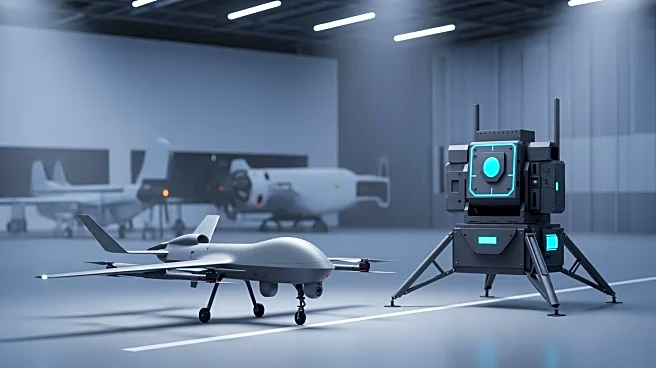What's Happening?
Larsen & Toubro (L&T), an Indian conglomerate, has partnered with General Atomics Aeronautical Systems (GA-ASI), a U.S.-based company, to produce Medium Altitude Long Endurance (MALE) Remotely Piloted
Aircraft Systems (RPAS) for the Indian armed forces. This collaboration positions L&T as the primary bidder in the Indian Ministry of Defence's procurement program for 87 MALE RPAS units, with GA-ASI providing technological support. The partnership aims to manufacture the MQ-series RPAS entirely in India, aligning with the Indian government's Atmanirbhar Bharat and Make in India initiatives. The agreement includes technology transfers and local content requirements, enhancing India's defense capabilities and self-reliance in aerospace technologies.
Why It's Important?
This partnership is significant as it strengthens India's defense capabilities and supports its strategic goal of self-reliance in defense manufacturing. By producing the MALE RPAS domestically, India reduces its dependency on foreign defense imports, which is crucial for national security. The collaboration also represents a substantial investment in India's defense sector, potentially leading to job creation and technological advancements. For the U.S., this partnership with L&T allows General Atomics to expand its market presence in India, fostering stronger bilateral defense ties. The initiative could also influence other countries to pursue similar collaborations, promoting global defense cooperation.
What's Next?
The next steps involve the execution of the procurement program, where L&T and GA-ASI will work on fulfilling the order for 87 MALE RPAS units. The successful implementation of this project could lead to further collaborations between Indian and U.S. defense companies. Additionally, the Indian government may continue to encourage similar partnerships to boost its defense manufacturing capabilities. Stakeholders, including defense contractors and policymakers, will likely monitor the project's progress to assess its impact on India's defense strategy and economic growth.
Beyond the Headlines
This development highlights the growing trend of international defense collaborations, which can lead to significant geopolitical shifts. By enhancing its defense manufacturing capabilities, India positions itself as a more formidable player in regional security dynamics. The partnership also underscores the importance of technology transfer in modern defense strategies, as countries seek to build indigenous capabilities while leveraging foreign expertise. This could lead to a reevaluation of defense procurement policies globally, as nations balance the need for self-reliance with the benefits of international cooperation.









